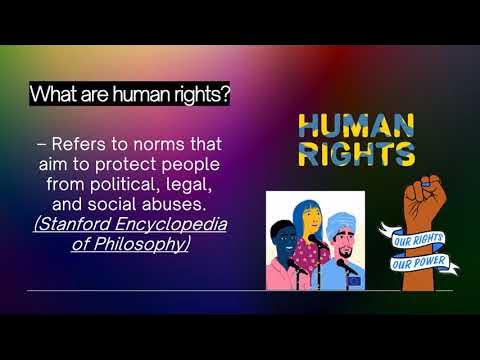1987 Constitution Article 2 Section 14
Summary
TLDRThe video script highlights the importance of gender equality in the Philippines, as mandated by the 1987 Constitution. It discusses the historical challenges faced by women and the progress made through legislation such as equal pay, anti-discrimination laws, and gender-based violence laws. The script also emphasizes international agreements, government initiatives, and the role of NGOs in promoting gender development. It calls for continued efforts to end discrimination and support women's rights.
Takeaways
- 🏛️ The 1987 Philippine Constitution emphasizes gender equality and the importance of women in nation-building.
- 🚫 The Constitution prohibits gender discrimination and promotes equal opportunities for both men and women.
- 📈 Historically, women have faced significant challenges in education, politics, employment, property rights, and reproductive health.
- 📊 Article 2 Section 14 of the Constitution mandates equal treatment before the law for women and men.
- 🌟 Women have made progress in leadership roles, reflecting the commitment to gender equality.
- 💼 Governments play a crucial role in adopting laws and policies that address gender disparities and discrimination.
- 📚 Examples of legislation supporting gender equality include gender-based violence laws, equal pay laws, and gender quota laws.
- 👶 Maternity and paternity leave policies aim to promote work-life balance and gender equality.
- 🚫 Anti-discrimination laws ensure equal treatment across various areas such as employment and education.
- 🌐 The Philippines has ratified international agreements that align with the goals of gender development and equality.
- 🌱 NGOs and civil society play a vital role in lobbying for change, conducting research, and providing services to promote gender equality.
Q & A
What is the significance of Section 14 in the 1987 Philippine Constitution regarding gender development?
-Section 14 of the 1987 Philippine Constitution emphasizes the importance of women in nation-building and pledges to offer gender equality before the law. It forms the basis for policies that support gender equality, combat discrimination, and advance the rights of women.
How does the inclusion of gender equality in the Philippine Constitution through the 14th amendments impact women's rights?
-The inclusion of gender equality through the 14th amendments marked significant progress in the fight for women's rights, ensuring equal protection under the law and granting suffrage, which are crucial steps towards eliminating discrimination and ensuring equal rights and opportunities.
What are the historical challenges women have faced in the Philippines?
-Historically, women in the Philippines have faced significant challenges in obtaining education, participating in politics, accessing employment and property rights, and controlling their reproductive health.
What is the role of legislation in promoting gender equality in the Philippines?
-Legislation plays a crucial role in promoting gender equality by adopting laws and policies that address gender disparities and discrimination, creating a framework for ensuring quality rights, opportunities, and protections for all genders.
Can you provide examples of legislation that support gender development and equality in various countries?
-Examples include gender-based violence laws, equal pay legislation, gender quota laws, policies providing maternity and paternity leave, anti-discrimination laws, and women empowerment laws.
How does the effectiveness of legislation on gender development and equality vary?
-The effectiveness of legislation can vary and depends on factors such as enforcement, social attitudes, and cultural norms.
What international agreements has the Philippines ratified that align with the goals of gender development?
-The Philippines has ratified several international agreements including the Convention on the Elimination of All Forms of Discrimination Against Women (CEDAW), the Beijing Declaration and Platform for Action, the Sustainable Development Goals (SDGs), and the Convention on the Rights of the Child (CRC).
What is the role of civil society and NGOs in promoting gender equality?
-Civil society and NGOs are important actors that articulate the needs and interests of citizens, lobby for change, carry out research, develop policies, mobilize resources, and even provide direct services. They play a crucial role in promoting gender equality.
What are some government initiatives in the Philippines that align with the Constitution's provisions on gender equality?
-Government initiatives include gender-sensitive education, programs for women's economic empowerment, legal reforms to address discrimination and violence against women, and gender-responsive budgeting to promote equitable resource distribution.
What are the potential future directions and challenges in advancing gender development in the Philippines?
-Future directions and challenges include supporting non-profit organizations focused on ending violence against women, promoting gender equality in leadership and decision-making, and addressing issues such as wage gaps, household responsibilities, and sexual violence.
How can individuals engage in supporting gender development and equality?
-Individuals can engage by supporting and advertising non-profit organizations, participating in events, and advocating for gender equality in their communities and workplaces.
Outlines

This section is available to paid users only. Please upgrade to access this part.
Upgrade NowMindmap

This section is available to paid users only. Please upgrade to access this part.
Upgrade NowKeywords

This section is available to paid users only. Please upgrade to access this part.
Upgrade NowHighlights

This section is available to paid users only. Please upgrade to access this part.
Upgrade NowTranscripts

This section is available to paid users only. Please upgrade to access this part.
Upgrade NowBrowse More Related Video

Gender and Society Chapter 1: Introduction 2025

4.1 - THE EVOLUTION OF THE PHILIPPINE CONSTITUTION & Biak-na-Bato Constitution

07 Good Citizenship values

Gender Sensitivity in the Workplace

Ano ang Constitution? Kahulugan at Pagkakaiba ( What is Constitution? Definition and Types )

Peace and Human Rights Concepts
5.0 / 5 (0 votes)